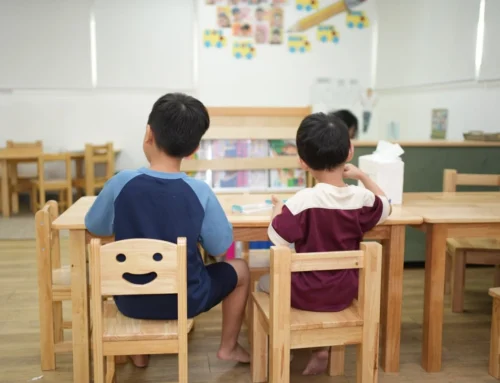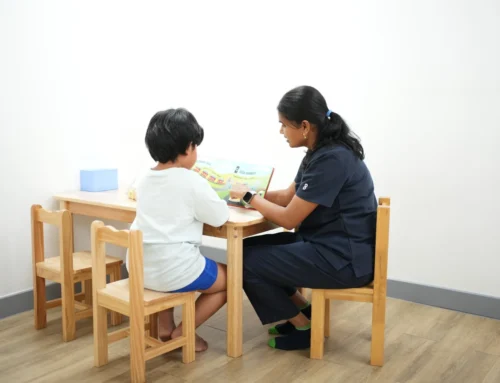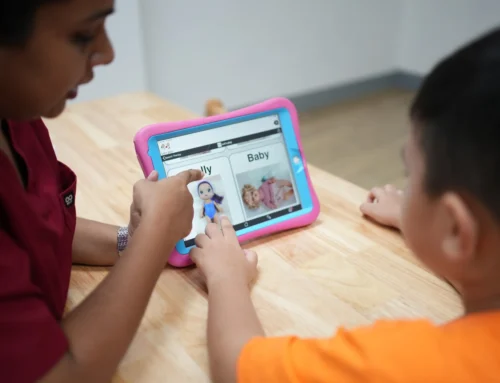In today’s growing field of speech and language therapy, evidence-based approaches are essential to achieving meaningful progress for children and adults with communication difficulties. In Cambodia, where speech therapy services are still developing, adopting internationally recognized frameworks such as PROMPT, Hanen, and PECS ensures that therapy is effective, structured, and tailored to each individual’s needs. At OrbRom Center, speech therapists in Phnom Penh apply these evidence-based methods to help children find their voice and reach their full communication potential.
What Are Evidence-Based Approaches in Speech Therapy?
An evidence-based approach means using methods supported by research, clinical expertise, and individual client needs. It ensures that every session is guided by proven strategies rather than guesswork. For children in Cambodia—especially those with autism, speech delays, or language disorders—this approach provides a reliable path toward measurable progress.
At OrbRom Center, therapists combine global best practices with culturally relevant techniques, ensuring therapy aligns with each child’s background, family involvement, and local educational environment.
The PROMPT Method: Hands-On Motor Speech Therapy
PROMPT (Prompts for Restructuring Oral Muscular Phonetic Targets) is a tactile-kinesthetic approach that helps children who struggle with speech motor planning or articulation. Therapists use gentle touch cues on the child’s face to guide movements of the lips, tongue, and jaw—essential for clear and coordinated speech.
In Phnom Penh, PROMPT has been particularly effective for children with apraxia of speech, Down syndrome, and motor speech disorders. By providing physical feedback, PROMPT teaches children how to move their muscles correctly, rather than only focusing on sound repetition.
Therapists at OrbRom Center’s speech therapy program integrate PROMPT with play-based and visual supports, making it both engaging and practical for children in Cambodia’s multilingual environment.
The Hanen Program: Empowering Parents as Communication Partners
The Hanen Program is another evidence-based model focused on building parent involvement in early communication development. Instead of relying solely on clinical sessions, Hanen empowers parents to become active communication partners in their child’s everyday life.
Through programs such as “It Takes Two to Talk” and “More Than Words”, families learn practical strategies for supporting language during daily routines—mealtime, playtime, or school transitions.
For families in Cambodia, where access to professional therapy may be limited outside major cities, Hanen provides sustainable strategies for long-term growth. At OrbRom Center’s preschool program, therapists coach parents and teachers to apply Hanen principles, ensuring that communication practice continues at home and in the classroom.
PECS: Building Communication Through Visual Exchange
PECS (Picture Exchange Communication System) is widely used to support children who are nonverbal or have limited speech, particularly those with Autism Spectrum Disorder (ASD). It teaches communication through picture symbols—allowing a child to exchange a card to request, comment, or respond before developing verbal speech.
This system reduces frustration, encourages social interaction, and provides an immediate means of expression. In Cambodia, PECS is proving transformative for children with autism who previously had no way to communicate their needs.
At OrbRom Center, therapists use PECS alongside Augmentative and Alternative Communication (AAC) devices to create individualized plans that promote independence and confidence.
Integrating Multiple Evidence-Based Methods
Every child’s journey is unique. Speech therapists often combine approaches like PROMPT, Hanen, and PECS with other evidence-based methods, such as:
-
Play-based therapy to make learning natural and motivating
-
Modeling and repetition techniques to enhance word acquisition
-
Visual supports and schedules to assist children with autism or ADHD
-
Sensory integration in collaboration with occupational therapy for children with sensory processing challenges
This holistic and individualized practice ensures that therapy at OrbRom Center addresses communication, emotional regulation, and overall development.
Why Evidence-Based Practice Matters in Cambodia
In Cambodia, where the field of speech therapy is still emerging, evidence-based practice provides a strong foundation for professional growth and client outcomes. It bridges the gap between international standards and local realities—helping children communicate effectively in Khmer, English, or other languages spoken at home and school.
By combining these global frameworks with community awareness programs, OrbRom Center is helping raise the standard for speech and language services in Phnom Penh, supporting children with autism, speech delays, and developmental differences to thrive in both home and school environments.
Conclusion
Evidence-based approaches like PROMPT, Hanen, and PECS are transforming speech therapy in Cambodia. They empower children to communicate, parents to participate, and therapists to deliver measurable, effective interventions. As awareness grows, more families in Phnom Penh are discovering how structured, research-backed therapy can change a child’s life.
If you believe your child may benefit from speech therapy, schedule an assessment at OrbRom Center to begin a personalized intervention plan grounded in proven methods and compassionate care.
We are the only Preschool specialized on children with special needs in PhnomPenh.
- Internationally qualified teachers
- Cambodia’s largest sensory room
- Outdoor swimming pool
- Covered outdoor playground
📞 Phone: 077.455.993
Telegram Link: https://t.me/OrbRom





